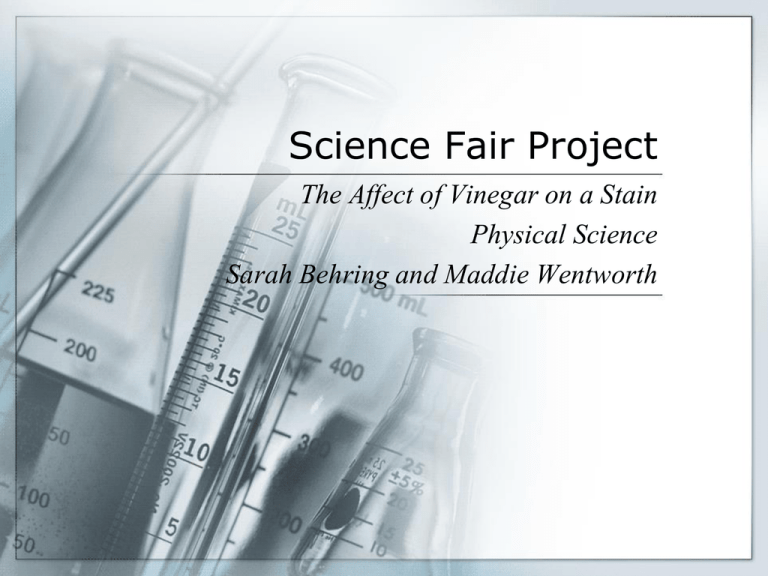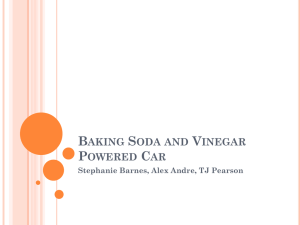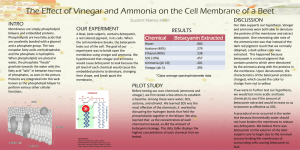Maddie Wentworth and Sarah Behring
advertisement

Science Fair Project The Affect of Vinegar on a Stain Physical Science Sarah Behring and Maddie Wentworth Statement of the Problem Which type of vinegar gets stains out best? Project Overview Our project went very smoothly and it was very easy. It just took a few simple steps. We gathered our materials then laid them all out. We decided which vinegar would go on which carpet. Then we poured the wine on each carpet and let it sit. We then poured the vinegar on the carpets and then rubbed it out. Finally, we made observations and came to a conclusion. Research Cider and rice vinegar are most commonly used for baking and cooking. Distilled vinegar is most commonly used for cleaning, but it may be used for baking and cooking sometimes, too. People say that distilled vinegar gets stains out really well and that it works like magic. Heinz company spokesperson “Michael Mullen has cited numerous studies to show that a straight five percent solution of vinegar such as you can buy in the supermarket kills ninety-nine percent of bacteria, eighty-two percent of mold, and eighty percent of germs (viruses).” Vinegar is “green friendly”, so don’t worry about it destroying the environment. According to the Vinegar Institute, vinegar was discovered by accident. Someone left there wine glass laying around for too long. The wine then became sour and turned to vinegar. Variables Independent variable: The type of vinegar used. Dependent variable: How well the stain is removed. Constant variables: The color and size of the carpet, the wine I use to stain the carpet, the amount of vinegar used. Control group: The distilled vinegar. Distilled vinegar is the control group because it is the vinegar that has statistically removed the stain better than the others. Hypothesis If I use the distilled(white) vinegar to remove stains, then the stains will come out, because distilled vinegar is stronger than the others and more commonly used for cleaning purposes. Materials 3 12.70x12.70 Carpet Squares 1 Stop Watch 3 Wash Cloths 45 mL of red wine 45mL of distilled(white) vinegar 45mL of rice vinegar 45mL of cider vinegar Procedure 1. Gather all materials. 2. Take the three pieces of carpet and lay them on the ground. 3. Spill 15mL of red wine on each carpet. 4. Wait 5 minutes for the wine to soak in. 5. Pour 45mL of rice vinegar on the first carpet. 6. Pour 45mL of cider vinegar on the second carpet. 7. Pour 45mL of distilled (white) vinegar on the last carpet. 8. Let the vinegar soak for 5 minutes. 9. Then take a wash cloth and blot each carpet dry with its own cloth. 10. Then look at each carpet and determine which vinegar got rid of the stain best. Photos Data/Observations (Analyzes) Qualitative Observations Quantitative Observations The wine and vinegar had a very strong smell especially when mixed together. There was three carpet samples and three different types of vinegar. The carpet had a rough texture. There was one bottle of red It wasn’t very smooth or soft. wine. The rice vinegar was very sticky. We used three rags to rub out the stains on each carpet. The carpet that we cleaned with cider vinegar got rid of the stain best. We patted and rubbed the stain out of the carpet for about 2 minutes per carpet. When the wine was poured onto the carpet, it spread all across the carpet. We let the stain sit for about 5 minutes before removing it. Conclusion When coming to our conclusion, we realized that our hypothesis was incorrect. The data didn’t support out hypothesis. The cider vinegar actually worked the best, the rice vinegar worked the second best, and the distilled(white) vinegar worked the least. We could tell this by closely analyzing and observing our carpets and the stains on them. Possible Experimental Errors Possible experimental errors could have been that there was maybe a little more wine or vinegar poured on one carpet then the other. This wouldn’t have drastically changed the results but it could have some impact. Another possible experimental error could be that some of the wine could have leaked through the carpet making it so that there is more wine in one carpet then the other. This could have could have easily changed the results of the experiment. Applications and Recommendations Based on the results of our experiment we would definitely make sure to find thicker carpet so the wine or vinegar doesn’t soak through as much as it did. This experiment was actually a good one because now we know how to get a stain out with an easy to access product if you don’t have any cleaning products. Works Cited Briggs, Margaret. Vinegar: a Sour-tasting Liquid Containing Acetic Acid : 1001 Practical Household Uses. [S.l.]: L7K Designs, 2007. Print. Gonzalez, Kellie. "The Ingredients of Vinegar." Personal interview. 10 Dec. 2010. Howard, Brian C. "Vinegar Uses –Vinegar Green Cleaning and Home Remedies - The Daily Green." Going Green, Fuel Efficiency, Organic Food, and Green Living - The Daily Green. Web. 12 Dec. 2010. <http://www.thedailygreen.com/greenhomes/latest/vinegar-uses-460409>. Shaeffer, By Michelle. "28 Practical Uses for Vinegar, Nature's Magic Cleanser." FrugalFun.com - Have More Fun, Spend Less Money. Web. 12 Dec. 2010. <http://www.frugalfun.com/vinegar.html>. "Uses for Vinegar." Cleaning With Vinegar - All Natural Solution - Go Green. Web. 12 Dec. 2010. <http://www.cleaningwithvinegar.com/>. "Why Clean with Vinegar?" Cleaning With Vinegar - All Natural Solution - Go Green. Web. 12 Dec. 2010. <http://www.cleaningwithvinegar.com/>.





